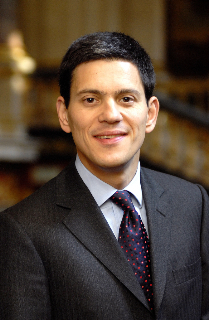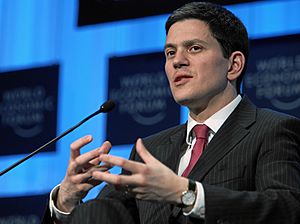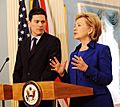David Miliband facts for kids
Quick facts for kids
David Miliband
|
|||||||||||||||||||||||||
|---|---|---|---|---|---|---|---|---|---|---|---|---|---|---|---|---|---|---|---|---|---|---|---|---|---|

Official portrait, c. 2007–10
|
|||||||||||||||||||||||||
| President of the International Rescue Committee | |||||||||||||||||||||||||
| Assumed office 1 September 2013 |
|||||||||||||||||||||||||
| Preceded by | George Erik Rupp | ||||||||||||||||||||||||
| Foreign Secretary | |||||||||||||||||||||||||
| In office 28 June 2007 – 11 May 2010 |
|||||||||||||||||||||||||
| Prime Minister | Gordon Brown | ||||||||||||||||||||||||
| Preceded by | Margaret Beckett | ||||||||||||||||||||||||
| Succeeded by | William Hague | ||||||||||||||||||||||||
| Secretary of State for Environment, Food and Rural Affairs | |||||||||||||||||||||||||
| In office 5 May 2006 – 27 June 2007 |
|||||||||||||||||||||||||
| Prime Minister | Tony Blair | ||||||||||||||||||||||||
| Preceded by | Margaret Beckett | ||||||||||||||||||||||||
| Succeeded by | Hilary Benn | ||||||||||||||||||||||||
| Minister of State for Communities and Local Government | |||||||||||||||||||||||||
| In office 11 May 2005 – 5 May 2006 |
|||||||||||||||||||||||||
| Prime Minister | Tony Blair | ||||||||||||||||||||||||
| Preceded by | Office established | ||||||||||||||||||||||||
| Succeeded by | Ruth Kelly | ||||||||||||||||||||||||
|
|||||||||||||||||||||||||
|
|||||||||||||||||||||||||
|
|||||||||||||||||||||||||
| Personal details | |||||||||||||||||||||||||
| Born |
David Wright Miliband
15 July 1965 London, England |
||||||||||||||||||||||||
| Political party | Labour | ||||||||||||||||||||||||
| Spouse |
Louise Shackelton
(m. 1998) |
||||||||||||||||||||||||
| Children | 2 sons | ||||||||||||||||||||||||
| Parents |
|
||||||||||||||||||||||||
| Relatives | Ed Miliband (brother) | ||||||||||||||||||||||||
| Residences | Upper West Side, Manhattan, New York City, U.S. | ||||||||||||||||||||||||
| Education | Bradford Grammar School Haverstock School |
||||||||||||||||||||||||
| Alma mater | |||||||||||||||||||||||||
| Awards | Kennedy Scholarship (1988) | ||||||||||||||||||||||||
| Signature |  |
||||||||||||||||||||||||
David Wright Miliband (born 15 July 1965) is a well-known figure who has worked in both politics and humanitarian aid. He is currently the president and CEO of the International Rescue Committee, a group that helps people affected by crises around the world.
Before this, David Miliband was a British Labour Party politician. He served as the Foreign Secretary for the UK from 2007 to 2010. He was also a Member of Parliament (MP) for South Shields from 2001 to 2013.
David and his brother, Ed, made history as the first brothers to be in the UK government's Cabinet at the same time since 1938. In 2010, David Miliband ran to become the leader of the Labour Party but was narrowly defeated by his brother, Ed. After this, he decided to leave politics.
Miliband began his career at a research group called the Institute for Public Policy Research. When he was 29, he became the Head of Policy for Tony Blair, who was then the leader of the Labour Party. He helped write the Labour Party's plans for the 1997 election, which they won. After the election, Blair made him the head of the Prime Minister's Policy Unit until 2001, when Miliband was elected to Parliament.
He held several junior government roles before joining the Cabinet in 2006 as the Environment Secretary. When Gordon Brown became Prime Minister in 2007, Miliband was promoted to Foreign Secretary. He was 41, making him one of the youngest people to hold that important job in many years.
In April 2013, Miliband left Parliament to become the President and CEO of the International Rescue Committee in New York City.
Contents
Early Life and Education
Family Background
David Miliband was born in London. His parents were immigrants: his father, Ralph Miliband, was a sociologist from Belgium, and his mother, Marion Kozak, was from Poland. Both of his parents came from Polish Jewish families. His mother was a teacher and a human rights activist.
David Miliband has said that being the child of Jewish immigrants is a very important part of his identity. His maternal grandfather survived the Holocaust because Catholic Poles protected him. In 2009, Miliband visited his family's tomb in the Jewish Cemetery in Warsaw, Poland. He spoke about his mother being saved there and how he feels connected to Poland.
Schooling and University

Miliband went to primary schools in Camden and Leeds. He later attended Bradford Grammar School and Haverstock Comprehensive School in London. He then studied at Corpus Christi College, Oxford, where he earned a top degree in Philosophy, Politics, and Economics. From 1988 to 1989, he earned a master's degree in Political Science at Massachusetts Institute of Technology in the US.
Political Career
David Miliband's first job was as a political analyst. From 1989 to 1994, he worked as a researcher and policy analyst at the Institute for Public Policy Research (IPPR).
Advising Tony Blair (1994–2001)
In 1994, Miliband became Tony Blair's Head of Policy. He helped create the Labour Party's plans for the 1997 general election. After Labour won, Blair made him the head of the Prime Minister's Policy Unit. He held this role until the 2001 election. He was sometimes called "Brains" by Alastair Campbell, a reference to a character from the TV show Thunderbirds.
Becoming a Member of Parliament
In the 2001 general election, David Miliband was elected as a Member of Parliament (MP) for South Shields. After a year, he became the Schools Minister, a junior role in the Department for Education and Skills.
In 2003, Miliband voted in favor of going to war in Iraq. He later explained that he believed Iraq had weapons of mass destruction at that time.
In December 2004, he became a Cabinet Office Minister. After Labour's election win in May 2005, he was promoted to the Cabinet. He became the Minister of State for Communities and Local Government. This new role focused on housing, planning, and local government.
Environment Secretary (2006–2007)
In May 2006, David Miliband became the Secretary of State for Environment, Food and Rural Affairs. He believed that farming is important for the UK's culture, economy, and environment. He also thought that controlling animal diseases should be balanced with caring for animals.
Miliband was the first British cabinet member to have a blog. He also said that all 27 nations of the European Union should work together to cut harmful emissions by 30% by 2020. He suggested the idea of "Carbon Credit Cards" for everyone to help reduce personal carbon use. He felt that individuals needed to be empowered to help fight Climate change.
Foreign Secretary (2007–2010)
On 28 June 2007, David Miliband was appointed Foreign Secretary by Prime Minister Gordon Brown. He was one of the youngest people to hold this important position. His younger brother, Ed Miliband, was also in the Cabinet, making them the first brothers to serve together in the Cabinet since 1938.
In February 2008, Miliband admitted that two US flights, which were part of a program to move prisoners, had stopped on Diego Garcia, a UK territory, in 2002. He apologized, saying the government had "made a mistake" in its previous statements.
India Trip and Sri Lanka
After the 2008 Mumbai attacks, Miliband visited India. He wrote that solving the dispute over Kashmir would help reduce extremism in the region. This comment upset the Indian government, which believes that no other country should interfere in the Kashmir issue.
During the final stages of the Sri Lankan Army's fight against the LTTE (Tamil Tigers), Miliband visited Sri Lanka. He urged the government to agree to a ceasefire to protect civilians. His visit led to protests by some Sri Lankan nationalists.
Views on Terrorism
In August 2009, Miliband discussed terrorism on a radio show. He stated that there are situations where terrorism might be seen as justified or effective, but it is "never effective on its own." These comments were criticized by other politicians.
European Foreign Minister Role
The Treaty of Lisbon created a new role called the High Representative of the Union for Foreign Affairs and Security Policy for the European Union. Miliband was considered for this role, but he publicly stated he wanted to remain in the British cabinet. Another British politician, Baroness Ashton, was appointed instead.
Relations with Israel
In March 2010, the UK expelled an Israeli diplomat. This was due to claims that an embassy official had forged passports related to an assassination. Miliband also warned against travel to Israel because of concerns about identity theft.
2010 Labour Leadership Election
Campaign and Outcome
After the Labour Party lost the general election in May 2010, Gordon Brown announced he would step down as party leader.
On 12 May, David Miliband announced he would run for the leadership. He was supported by many members of Parliament. Other candidates included his brother, Ed Miliband. David Miliband received the most nominations.
The election results were announced on 25 September 2010. David Miliband led in the early rounds of voting, but in the final round, he narrowly lost to his brother Ed. On 29 September 2010, David Miliband announced he would leave frontline politics. He said he wanted to avoid "constant comparison" with his brother and prevent distractions for the party.
Leaving Politics
Miliband resigned from the shadow cabinet in October 2010 but continued to serve as the MP for South Shields. He also volunteered to teach Government and Politics at Haverstock School. In 2011, he became a Senior Global Advisor for Oxford Analytica.
Leading the International Rescue Committee
On 26 March 2013, David Miliband announced he would resign as an MP and leave politics. He took on the role of head of the International Rescue Committee (IRC) in New York. He officially became the president and CEO of the IRC on 1 September 2013.
At the IRC, Miliband oversees humanitarian aid and development programs in 40 countries. The organization has a large global staff and many volunteers, with a significant annual budget.
Syria's Civil War Response
The IRC has been actively helping with Syria's refugee crisis. In October 2013, Miliband expressed concern that focusing only on destroying chemical weapons in Syria might make people forget about the ongoing conflict. He said there were big risks in not getting involved militarily. He noted that the IRC was providing aid to Syrians across borders, reaching people in besieged cities who were cut off from UN help.
In February 2014, Miliband repeated that the US and other nations needed to help Syria both politically and financially. He highlighted that one in two Syrians had been displaced because the government was using "barrel bombs" on its own citizens.
Typhoon Haiyan Response
In November 2013, as IRC CEO, Miliband directed the organization to respond to Typhoon Haiyan in the Philippines. He launched a large fundraising effort to help those affected by the storm. The IRC sent an emergency team to Manila to decide what aid was most needed, such as water, sanitation, or education.
In 2017, the IRC helped 1.14 million children with schooling, resettled over 10,000 refugees in the US, and helped reunite families separated at the US border. In April 2018, Miliband told The New York Times that he wanted the IRC to be a strong leader in global humanitarian efforts.
Personal Life
David Miliband married Louise Shackelton, a professional violinist, in 1998. They have adopted two sons from the United States. The family currently lives in New York City.
Miliband has stated that he grew up in a non-religious home and describes himself as an atheist, though he has "huge respect" for people of faith.
Awards and Honours
- 1988: Kennedy Scholarship
- 2016: Honorary Doctorate, The New School
Images for kids
See also
 In Spanish: David Miliband para niños
In Spanish: David Miliband para niños
 | Sharif Bey |
 | Hale Woodruff |
 | Richmond Barthé |
 | Purvis Young |





